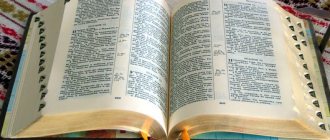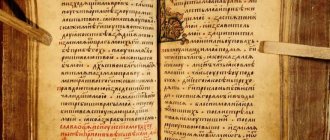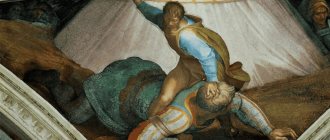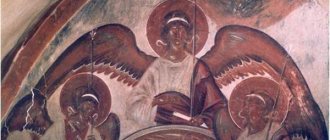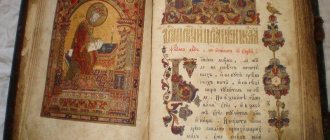History of writing
The second psalm is considered messianic, that is, containing prophecies about Christ. In the Hebrew, Greek and Latin Bibles this psalm is not spelled with the name of David, but in the Slavic tradition it exists. However, in the book of the Acts of the Apostles, Peter quotes the psalm in response to the persecution of Christian believers by priests ruled by Herod and Pontius Pilate. At the same time, the Apostle Peter noted that this is what the servant of God, Father David, says.
Attention! We recommend that you read a prayer for money to Spyridon of Trimifuntsky, which can be done on this page.
Building on the promise of Psalm 2, Peter talks about the protection of Jesus Christ for those who have strong faith. Scholars imply that the writing of this psalm dates back to the time when God's ark had already been transported to Zion.
In the opening verses of Psalm 2, King David wonders how princes and kings can rebel against their Creator.
From verses 1 to 4, David , fighting in endless wars, knows that the Lord is next to him, calls all wars against the Almighty senseless. They will provoke the wrath and laughter of the Lord. That is, all attempts to overthrow the Lord’s Anointed will end in their desecration and ridicule. No one managed to overthrow David, who enlisted the support of the Lord himself.
Verse 7 tells us that the Lord God begat His Son. King David considers himself one. Also in the verse we find lines that the Messiah was originally with God, from the very creation of the world.
Verses 8-9 contain a powerful promise from the Creator. Christians can ask him for everything, most importantly for good and with pure faith. All enemies and problems will be destroyed by the rod and will disappear like fragments of an earthen vessel.
The Lord gives King David the right to rule the earth, holding an iron rod in his hands, and all his enemies will become like clay vessels that he can easily defeat.
Verses 10-11 are an appeal to kings in authority. They serve the Creator with fear and trembling.
Music settings[edit]
In 1567, Thomas Tallis wrote Psalm 2, "Why is he not seen", for his Nine Tunes of Archbishop Parker's Psalter
.
Psalm 2 is one of the psalms used in Handel's Messiah. He set verses 1 to 9 in four parts of the second part, starting with part 40.
In France, Pierre Robert composes one grandiose motet Quare fremuerunt gentes for
La Chapelle Royale at the Louvre.
Marc-Antoine Charpentier set around 1675 one Quare fremuerunt gentes
H.168 - H.168 a, for soloists, double choir, strings and continuo, another, for 3 voices, 2 high instruments and continuo H.184, approx. 1682
_
Michel-Richard de Lalande wrote his great motet (S70) on this psalm in 1706. Jean-Baptiste Lully did the same.
Verse 8 of Psalm 2 is used in the song "You Said" by Reuben Morgan.
Verses 1–4 form one of the texts that Leonard Bernstein used for his Chichester Psalms
. It is used as an analogue to Psalm 23 in the second movement, sung by tenors and basses.
Why is Psalm 2 read?
There are no strict rules for reading Psalm 2. Although some believe that it should be read by high-ranking people, for example, prime ministers, deputies, directors, and the president. That is, those who are endowed with certain powers, authority and are responsible for people. Then this applied to kings, today to presidents and all people who have a high position and a certain power.
Be that as it may, the habit of reading the psalms of King David changes a person’s thinking, filling it with:
- strong faith;
- the desire to send prayers to the Lord;
- the desire to do good to people;
- a sense of security and confidence in the future.
Uses
Judaism
Verse 1 is read during Selichot.[14]
This psalm is also read to relieve headaches and when caught in a sea storm.[15]
New Testament
Some verses from Psalm 2 are referenced in the New Testament:
- Verses 1-2: in Acts 4:25-26.[16]
- Verse 7: in Acts 13:33; Hebrews 1:5; Hebrews 5:5.[16]
- Verses 8-9: in Revelation 2:26,27; 12:5; 19:15.[16]
Catholic Church
According to the Rule of St. Benedict (530 AD), Psalm 1 to Psalm 20 were mainly reserved for the office of the principal. This psalm was chosen by St. Benedict of Nursia on Monday of the Prime Office, in the Rule of St. Benedict from 530 it was read or sung between Psalm 1 and Psalm 6.[17]
In the Liturgy of the Hours, Psalm 2 is sung or recited in the Chapel on Sunday of the first week,[18] with Psalm 1 and Psalm 3. Every Tuesday, Opus Dei faithful, after invoking their Guardian Angel and kissing the rosary, recite Psalm 2 in Latin.[19]
Book of Common Prayer
In the Church of England the Book of Common Prayer
Psalm 2 is assigned to be read on the morning of the first day of the month.[20]
Psalm 2: Interpretation and Explanation
As you already understand, psalms are different. There are psalms of repentance, joy, thanksgiving, and there is a special section of psalms - “messianic”. The Messiah is one of the key concepts of sacred scripture and sacred history. Translated from Hebrew it means “anointing” and in Greek it sounds like “Christ”. By the way, in Hebrew the word “messiah” sounds like “Mashiach”. The fact is that the Greeks do not have the letter “Sh” in their dictionary, and where the Jew said “Sh”, the Greek pronounced “S”. So “Moshe” became “Moses”, and “Shlomo” became “Solomon”.
Scripture speaks about the Messiah for the first time when it talks about the Fall. The Lord God put it between the serpent, who drew the wife and her husband into sin, and between the wife. From the seed of the woman, the Lord promised the coming into the world of a redeemer who would erase the head of the serpent.
To this day, the main difference between Jews and Christians is that we believe in the Messiah who has already come, while the Jews are still waiting for him. This is the main theme of all Jewish history. Passionate anticipation of the coming of the Redeemer and a passionate desire to bring this hour closer.
Psalm 2 speaks of the Messiah as having already come. The psalm says that the princes of the earth and kings, glorious people, gathered together to overthrow the divine law.
Christ calls his commandments and teachings a good yoke. It is this yoke that people who have been separated from their knowledge for several centuries have been trying to throw off. Thus, a person with a fever tears off his bandages and plasters. This situation is understandable from within the life we live. People have been trying to erase from themselves the last signs of belonging to faith for several centuries. It is human nature to be proud of what is above him. Thus, a Hindu is proud of the Vedas, and a Muslim is proud of the Haran. Only former Christians, civilized and educated, are proud not of Christ and his Gospel, but of actresses and athletes, travelers and scientists. At the table of the world the Lord was given the last place, as the last beggar.
In the psalm, the Lord God is depicted as laughing, and he knows very well that those who are at enmity against him are at enmity against themselves. Ivan Andreevich Krylov has a wonderful fable about how people began to be at enmity with the sky. They collected a bunch of deadly metal, stones, darts, arrows and began to fiercely and furiously throw it all upward. The ending is predictable. The weapon fell on the heads of the madmen. This happens to everyone who is at enmity against God.
The psalm promises wrathful retribution. Moreover, the Son – the Anointed One, the Messiah – will be angry and punish. In the second psalm, Christ does not appear in the image in which we are accustomed to looking at him in the Gospel. If there he is meek and merciful, then in Psalm 2 he looks more like himself from the apocalypse. He is formidable and great, and in his hands is a rod with which he crushes nations like clay pots.
“Glorify your son so that he does not become angry, honor your son,” says the psalm. And these words equally apply to both Jews who do not believe in Christ and former Christians whose lifestyle has turned away from the sun.
Links[edit]
- "Parallel Latin/English Psalter/Psalm 2". Archived from the original on September 30, 2022. Retrieved September 19, 2019.
- ↑
Acts 4:24–26 - Abramowitz, Rabbi Jack (2018). "Psalms - Chapter 2". Orthodox Union
. Retrieved August 25, 2022. - ^ abcd Aranda, Mariano Gomez (2018). "Medieval Jewish Exegesis of Psalm 2" (PDF). Journal of the Hebrew Scriptures
.
18
. DOI: 10.5508/jhs.2018.v18.a3. - Sonchin Talmud edition. Online here
- ↑
Soncino Midrash Rabbah (vol. 1, pp. 365–366) - "Midrash Tehillim/Psalms 2" (PDF). matsati.com. 2012. Retrieved January 20, 2022.
- Gunkel Hermann: Die Psalmen (Göttingen 1926), p5.
- "Hans-Joachim Kraus , Psalms 1–63. 1. Theilband, (Neukirchen-Fluin 1972), pp. 13f.
- siehe Hossfeld, Frank-Lothar and Erich Sänger: Die Psalmen, Bd. 1, Psalm 1–50, (Würzburg 1993), p50.
- Henry, Matthew (2019). "Psalm 2". Bible Study Tools. Retrieved January 20, 2022.
- Spurgeon, Charles (2019). "Psalm 2 Bible Commentary". Christianity.com
. Retrieved January 20, 2022. - "Adam Clarke Commentary: Psalms 2". Study the light. 2022. Retrieved January 20, 2022.
- Jump up
↑ Brauner, Reuven (2013). "Shimush Pesukim: A Complete Index to the Liturgical and Ceremonial Uses of Biblical Verses and Passages" (PDF) (2nd ed.). paragraph 31. Retrieved August 25, 2022. - "Illness, Travel". Daily Tehillim
. Retrieved January 20, 2022. - ^ abc Kirkpatrick, A. F. (1901). The Book of Psalms: With Introduction and Notes. Cambridge Bible for Schools and Colleges. Book IV and V: Psalms XC-CL. Cambridge: University Press. item 838. Retrieved February 28, 2022.
- translation from Prosper Gueranger, Regla de
Saint-
Benoit
, (Abbaye Saint-Pierre de Solesmes, reimpression en 2007). - The main cycle of liturgical prayer lasts four weeks.
- De Spiritu y de piis servandis consuetudinibus
- (Del Espiritu y de las Costumbres, Roma, 1990) Edition - n ° 116. - ↑
Church of England, Book of Common Prayer: A Psalter, printed by John Baskerville in 1762. - The Dead Sea Scrolls: A New Translation. Wise, Michael Owen, 1954-, Abegg, Martin G., Jr., Cook, Edward M., 1952- (Revised edition). [San Francisco]. 2005-10-25. ISBN 006076662X. OCLC 60341070.CS1 maint: others (link)
- ^ ab Collins, John J. (01/01/2009). "Interpretation of Psalm 2". Echoes of the Caves: Qumran and the New Testament
: 49–66. DOI: 10.1163/ej.9789004176966.i-350.13. ISBN 9789047430407. - 1 Enoch: a translation of Hermenea
. Nickelsburg, George W. E., 1934-, VanderKam, James S. (Ed. Ed.). Minneapolis, MN: Fortress Press. 2012. ISBN 9781451424379. OCLC 840417499.CS1 maint: others (link) - ^ ab Jancy, Sam. You are my son
. pp. 55–68. - ↑
Psalms of Solomon 17:23-24, New English Septuagint translation - "Archival copy". Archived from the original on 2012-10-21. Retrieved 2 December 2012.CS1 maint: archived copy as title (link)
- ↑
Parsons, John J. "Psalm 2 in Hebrew". Hebrew for Christians. - "12. Objections to the 2nd and 22nd Psalm." truth.net.
- "Jewish Interpretations of "Bar" as "Son" in Psalm 2:12". Jews for Jesus. 1997
Psalm 2: text with accents and translation into Russian
Text in Church Slavonic with accents:
Text in Russian:
Reading the beginning of this psalm, we understand that some kind of global conflict is brewing, in which peoples and tribes are drawn. That is, we are not talking about the confrontation between the Jewish people and the Philistines, but something more global, something more significant. But any rebellion against God will never succeed. During this global uprising, people tried to throw off the yoke of God's commandments. Their goal is to remove all taboos in order to fulfill their hedonistic aspirations. But all their attempts initially seem vain, meaningless, they are all meaningless.
The kings and princes have formed some kind of conspiracy against the Lord and his Anointed One, and hold council with each other. They planned to curtail the commandments of the Sinai revelation and abandon the yoke of the Gospel commandments.
But how can their rebellion culminate, when all kings and princes are unanimous against God? How will their global project end? Of course, they cannot defeat the Creator.
As long as we remain faithful to the head of the church - the Lord God, the enemy will not be able to defeat us. Why does Christ say: “Be wise as serpents!” This is because the snake always protects its head, since during an attack everyone tries to hit it.
But if kings and princes come to their senses and continue to serve the Lord with fear and joy, they have a chance of salvation.
The following is about honoring the Son of God. Why is it not said here about honoring the Father? The fact is that we cannot come to the Father without passing by the son. It turns out that he who believes in the Son also believes in the Father. Therefore, reverence for the Son is reverence for both the Father and the Holy Spirit.
Why is it believed that Psalms 1 and 2 were a single work? Because the first psalm begins with the word “blessed,” and the second ends with “blessed are all those who trust in him.” On this basis, ancient Christians and Jews believed that this is one psalm, which was divided into two in order to emphasize the features of the messianic meaning of Psalm 2 in relation to the first, which is the general constitution, the quintessence of the entire content of the Psalter.
Controversy[edit]
English-speaking Protestant Christians usually (but not always) translate verse 12 as “Kiss of the Son,” as in the King James Version. The most common Jewish interpretation is "Accept purity", an interpretation close to that of Catholics, who traditionally follow the Vulgate and translate the phrase as "Accept discipline". To translate as “Kiss of the Son,” the word “bar” should be read as Aramaic (“son,” but the Hebrew for “son” is “ben”), not Hebrew (“purity”) or “discipline of the Septuagint and Vulgate.” ", "training", "training". (The New American Bible reconciles by combining verses 11 and 12 of other Bibles into an entirely new verse 11. [26] Some Jewish authors accuse Protestant Christians of arbitrarily interpreting the word as in another language in order to give the text a meaning more favorable for Christians ("son", understood as Jesus). Protestants, however, cite other passages in the Bible with individual Aramaic words found in Hebrew, such as the same word for "bar" found in Proverbs 31:2.[27][ 28] [29]
Psalter. Psalm 2. Listen.
As we noted above, this psalm is not inscribed in the oldest manuscripts.
However, already in the first century there was a tradition of identifying authorship with David. Psalm 2 is royal. It can be assumed that it was originally performed during the solemn celebration of the king’s ascension to the throne of Jerusalem in the pre-exilic period. It is possible that this psalm was repeated annually in the temple on the day of the king's coronation.
If we follow the Hebrew version of the text, then verses 1-6 and 10-12 sound like the leader of the service, while verses 7-9 sound like the response verses of the king himself.
If you follow the Greek version of the psalm, the entire text in it comes as if from the perspective of the psalmist, that is, the king.
Listen to how beautiful Psalm 2 sounds, because the tradition of singing was formed back in the Old Testament period, so most of the psalms were intended for singing. It is noted that Orthodox Christians experience a special closeness to God during psalmody.
Content
- 1 Background and themes
- 2 Text 2.1 Hebrew version of the Bible
- 2.2 King James Version
- 3.1 Judaism
- 5.1 Dead Sea Scrolls
